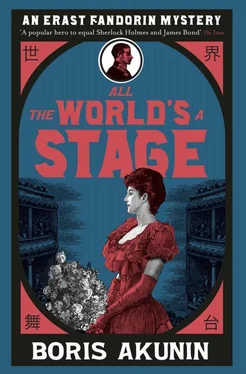Eliza stood in the door, outraged.
Well, well, at their first meeting this gentleman, Erast Ivanovich, no, Erast Petrovich, with some rather unusual surname, had made a good impression on her. Handsome, a good age for a man, about forty-five, with the advantageous combination of a fresh face and noble grey hair. The only thing was that his taste in clothes was not quite right – excessively elegant, and what man of insight wore a pearl in his necktie nowadays? But his manner was irreproachable. It was obvious immediately that he was man of society. Perhaps she might even have been interested in him, if only he did something worthwhile. But a repertoire manager – that was boring, that was for someone like Gogol’s Bashmachkin. He had called himself a traveller, it was true. Most likely he was a fanatical theatre lover, one of those society drones who dreamed of getting into the world of theatre. Quite a common type. In the Art Theatre there was a former general who played third-level roles without being paid for it.
‘I didn’t think you were the curious kind, sir,’ Eliza said disdainfully when he noticed her.
As soon as the dramatic death of Hippolyte Emeraldov had become known, the building had come under a genuine siege – reporters, inconsolable admirers and lovers of scandal had all but climbed in through the windows. But the ‘traveller’ had obviously acted more cunningly. He had come at a late hour, after the crowd had dispersed, and slipped the nightwatchman a banknote.
‘Yes, madam, there are many curious aspects to this business,’ Fandorin (that was his surname) had replied in an equally cool tone, and without even the slightest sign of embarrassment.
‘I ask you to leave. Outsiders are not allowed in here. When all is said and done, it’s indecent!’
‘Very well, I shall go. In any case, I have already seen everything.’ He bowed slightly, almost casually, in farewell, and told Antip: ‘Madam Lointaine is quite right. Lock the door and don’t allow anyone else in. Goodbye, madam.’
‘“Goodbye”?’ she asked in a hostile tone of voice. ‘Have you changed your mind about coming to work as our repertoire manager?’
‘Yes, I have. But we shall see each other soon.’
And now they really had seen each other.
‘I would like to have a f-few words with you in private,’ grey-haired Fandorin said to the director, still acting out his agitation in the same inept manner. A man with eyes of ice could not know what agitation was! ‘But I can wait until you have finished…’
‘No, no, by no means. We will have a talk immediately, and quite definitely in private.’
Stern took the ‘traveller’ by the arm and led him away.
‘Busy yourselves with something. I’ll be back soon. Take a close look at the new Lopakhin. You should each work out a sketch of your psychological relationship with this man… Please come to my study, Erast… mmmm… Petrovich.’
However, Stern’s ‘soon’ stretched out into quite a lengthy period. There was no point in Eliza taking a closer look at the new Lopakhin: firstly, in the course of the play her Anya had hardly any contact at all with the peasant’s son; and secondly, in any case Lopakhin would be played in the production by Leonidov or someone else equally great, but most certainly not by Nonarikin, no matter what a lovely man he might be.
The poor soul pestered one of them after the other, but no one wanted to ‘establish a psychological relationship’ with him.
Eliza sat there, muffled up in her shawl, absent-mindedly listening to the conversations.
Anton Ivanovich Mephistov proposed sardonic conjectures concerning the repertoire manager’s ‘imposing grey locks’ and then asked Sensiblin, as a ‘specialist on grey locks’, how much bluing was required to maintain such a noble whiteness. The phlegmatic Lev Spiridonovich did not rise to the bait.
‘You don’t like handsome men, everyone knows that. Drop it, Anton Ivanich, in a man the important thing is not the face, but the calibre,’ he said good-naturedly.
‘Just listen to him, how judicious and kind-hearted he is,’ Reginina whispered about her former husband. ‘I don’t understand how I could have lived with this man for seven years! Calculating, vindictive, never forgets a thing! Pretends to be a lamb, and then strikes a sly, underhand blow, bites like a snake.’
Eliza nodded. She herself disliked rationalising individuals – both in life and on the stage. She and Vasilisa Prokofievna were allies in their attitude to Sensiblin. Eliza was the only one in the entire company who knew why the grande dame hated the ‘philosopher’ and what she could never forgive him for.
One day, overcome by a sudden impulse to confide in someone, Reginina had told Eliza a story that made her skin creep. How hideously vengeful betrayed husbands could be!
At the time when this story happened, Vasilisa Prokofievna was still playing heroines and she and Lev Spiridonovich worked together in a first-class imperial theatre. Reginina was playing Marguerite in La Dame aux Camélias – it was a highly successful adaptation of the novel, and the role of the noble courtesan had been written with heart-rending power. ‘The way I died set the entire hall sobbing and blowing their noses,’ Reginina recalled, becoming emotional herself and reaching for her handkerchief. ‘As you know, Eliza, Sarah Bernhardt is usually considered the finest performer of the role of Marguerite Gautier. But believe it or not, I played her even more powerfully! All the foreigners who saw me simply went out of their minds. The European press wrote about the production. You don’t remember, you were still a little girl… And what do you think? Word of my Marguerite actually reached Her. Yes, yes, the great Bernhardt herself! And so she came to St Petersburg. Supposedly on tour, but I knew she wanted to take a look at me. The great day came and they told me: she’s in the audience! My God, what happened to me! On that day Their Majesties came, but of course, all the people of understanding were looking only at the box where Bernhardt was sitting. Would she approve, I wondered. Ah, how I played! And on a continuously mounting crescendo. They told me afterwards that the great Sarah was sitting there more dead than alive – she was eating her heart out with envy. Finally the culmination of the action was approaching. I have a scene with Armand, I am at death’s door. Lev Spiridonovich was playing Armand, he was rather good in that role too. Everyone called us an exquisite couple. But we had had a terrible quarrel, just before the performance. It just happened that in a moment of weakness – I had turned quite dizzy – I yielded to the importunate advances of the second lover, Zvyozdich (he was a very handsome-mannered man) and someone snitched to my husband – well, you know the way it is with us. All right, I’m guilty. Hit me, rip my favourite dress to shreds with a knife, be unfaithful to me with someone else in revenge! But what did Lev do? There I am declaiming my crowning line: “My darling, all I ask is that you cry a little for me”. And suddenly… Armand had these beautiful, thick false eyebrows. And two jets of water came shooting out from under them! That villain had fastened on a clown’s water tubes under his make-up! The audience almost split their sides laughing. The tsar laughed, and the tsarina too. Sarah Bernhardt almost had a fit… The worst thing was that I was lying there at my last breath, absolutely shattered, and I couldn’t understand a thing! Afterwards, it’s true, the reviewers wrote that it was a revolutionary interpretation, that it was a brilliant invention that emphasised the tragi-farcical nature of life and the paltry distance between melodrama and slapstick! But never mind that! He stole the most important moment in my life and trampled it underfoot! And since then that man has been dead to me.’
Читать дальше









